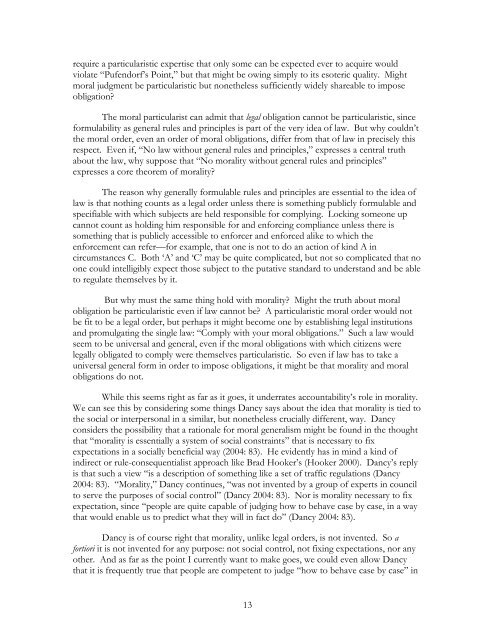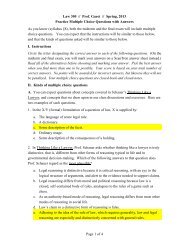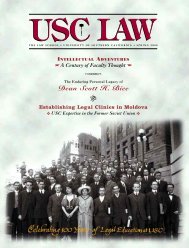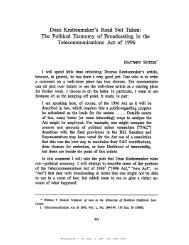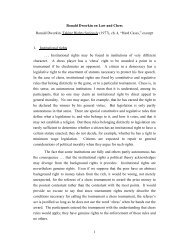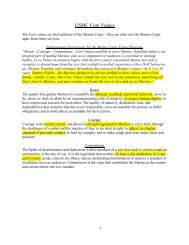1 MORALITY AND PRINCIPLE Jonathan Dancy is largely ...
1 MORALITY AND PRINCIPLE Jonathan Dancy is largely ...
1 MORALITY AND PRINCIPLE Jonathan Dancy is largely ...
Create successful ePaper yourself
Turn your PDF publications into a flip-book with our unique Google optimized e-Paper software.
equire a particular<strong>is</strong>tic expert<strong>is</strong>e that only some can be expected ever to acquire wouldviolate “Pufendorf’s Point,” but that might be owing simply to its esoteric quality. Mightmoral judgment be particular<strong>is</strong>tic but nonetheless sufficiently widely shareable to imposeobligation?The moral particular<strong>is</strong>t can admit that legal obligation cannot be particular<strong>is</strong>tic, sinceformulability as general rules and principles <strong>is</strong> part of the very idea of law. But why couldn’tthe moral order, even an order of moral obligations, differ from that of law in prec<strong>is</strong>ely th<strong>is</strong>respect. Even if, “No law without general rules and principles,” expresses a central truthabout the law, why suppose that “No morality without general rules and principles”expresses a core theorem of morality?The reason why generally formulable rules and principles are essential to the idea oflaw <strong>is</strong> that nothing counts as a legal order unless there <strong>is</strong> something publicly formulable andspecifiable with which subjects are held responsible for complying. Locking someone upcannot count as holding him responsible for and enforcing compliance unless there <strong>is</strong>something that <strong>is</strong> publicly accessible to enforcer and enforced alike to which theenforcement can refer—for example, that one <strong>is</strong> not to do an action of kind A incircumstances C. Both ‘A’ and ‘C’ may be quite complicated, but not so complicated that noone could intelligibly expect those subject to the putative standard to understand and be ableto regulate themselves by it.But why must the same thing hold with morality? Might the truth about moralobligation be particular<strong>is</strong>tic even if law cannot be? A particular<strong>is</strong>tic moral order would notbe fit to be a legal order, but perhaps it might become one by establ<strong>is</strong>hing legal institutionsand promulgating the single law: “Comply with your moral obligations.” Such a law wouldseem to be universal and general, even if the moral obligations with which citizens werelegally obligated to comply were themselves particular<strong>is</strong>tic. So even if law has to take auniversal general form in order to impose obligations, it might be that morality and moralobligations do not.While th<strong>is</strong> seems right as far as it goes, it underrates accountability’s role in morality.We can see th<strong>is</strong> by considering some things <strong>Dancy</strong> says about the idea that morality <strong>is</strong> tied tothe social or interpersonal in a similar, but nonetheless crucially different, way. <strong>Dancy</strong>considers the possibility that a rationale for moral general<strong>is</strong>m might be found in the thoughtthat “morality <strong>is</strong> essentially a system of social constraints” that <strong>is</strong> necessary to fixexpectations in a socially beneficial way (2004: 83). He evidently has in mind a kind ofindirect or rule-consequential<strong>is</strong>t approach like Brad Hooker’s (Hooker 2000). <strong>Dancy</strong>’s reply<strong>is</strong> that such a view “<strong>is</strong> a description of something like a set of traffic regulations (<strong>Dancy</strong>2004: 83). “Morality,” <strong>Dancy</strong> continues, “was not invented by a group of experts in councilto serve the purposes of social control” (<strong>Dancy</strong> 2004: 83). Nor <strong>is</strong> morality necessary to fixexpectation, since “people are quite capable of judging how to behave case by case, in a waythat would enable us to predict what they will in fact do” (<strong>Dancy</strong> 2004: 83).<strong>Dancy</strong> <strong>is</strong> of course right that morality, unlike legal orders, <strong>is</strong> not invented. So afortiori it <strong>is</strong> not invented for any purpose: not social control, not fixing expectations, nor anyother. And as far as the point I currently want to make goes, we could even allow <strong>Dancy</strong>that it <strong>is</strong> frequently true that people are competent to judge “how to behave case by case” in13


